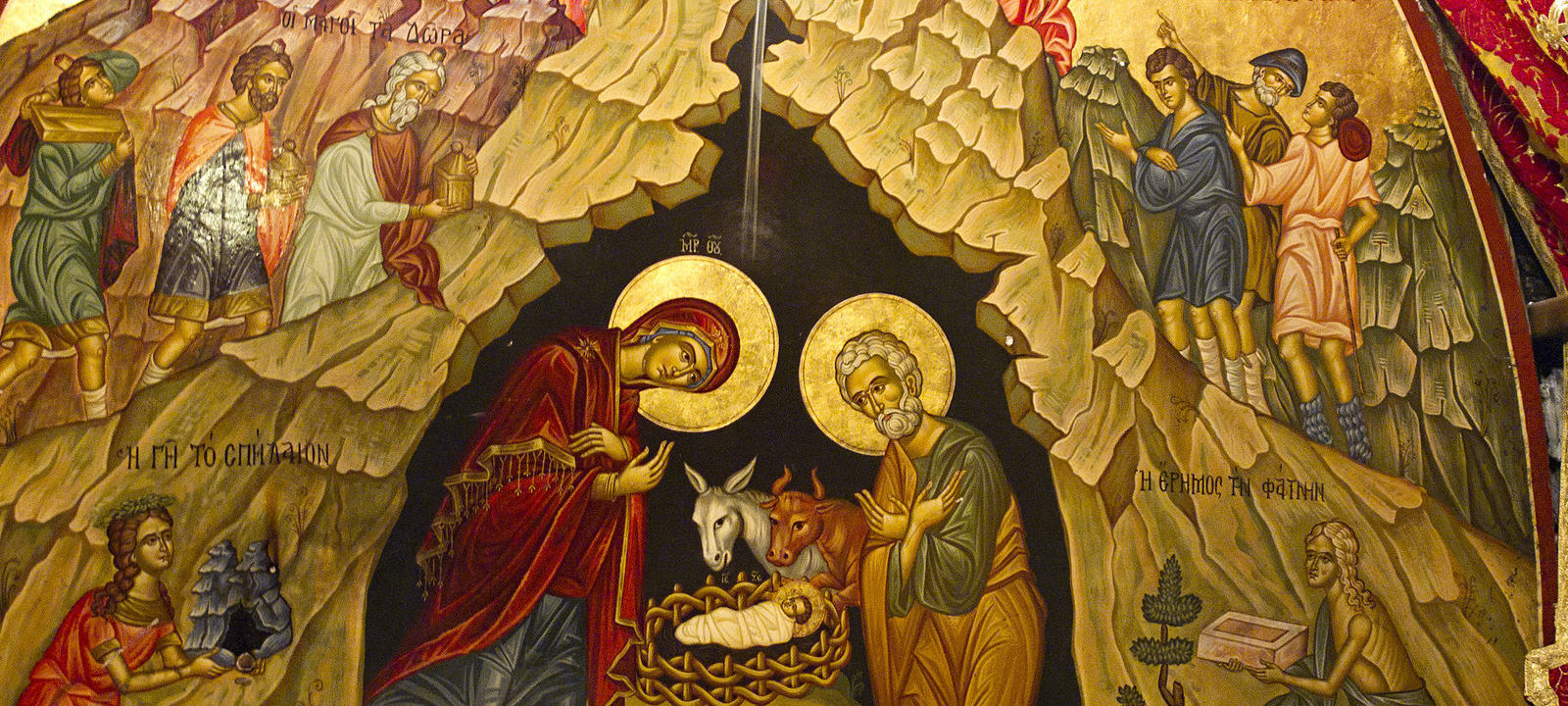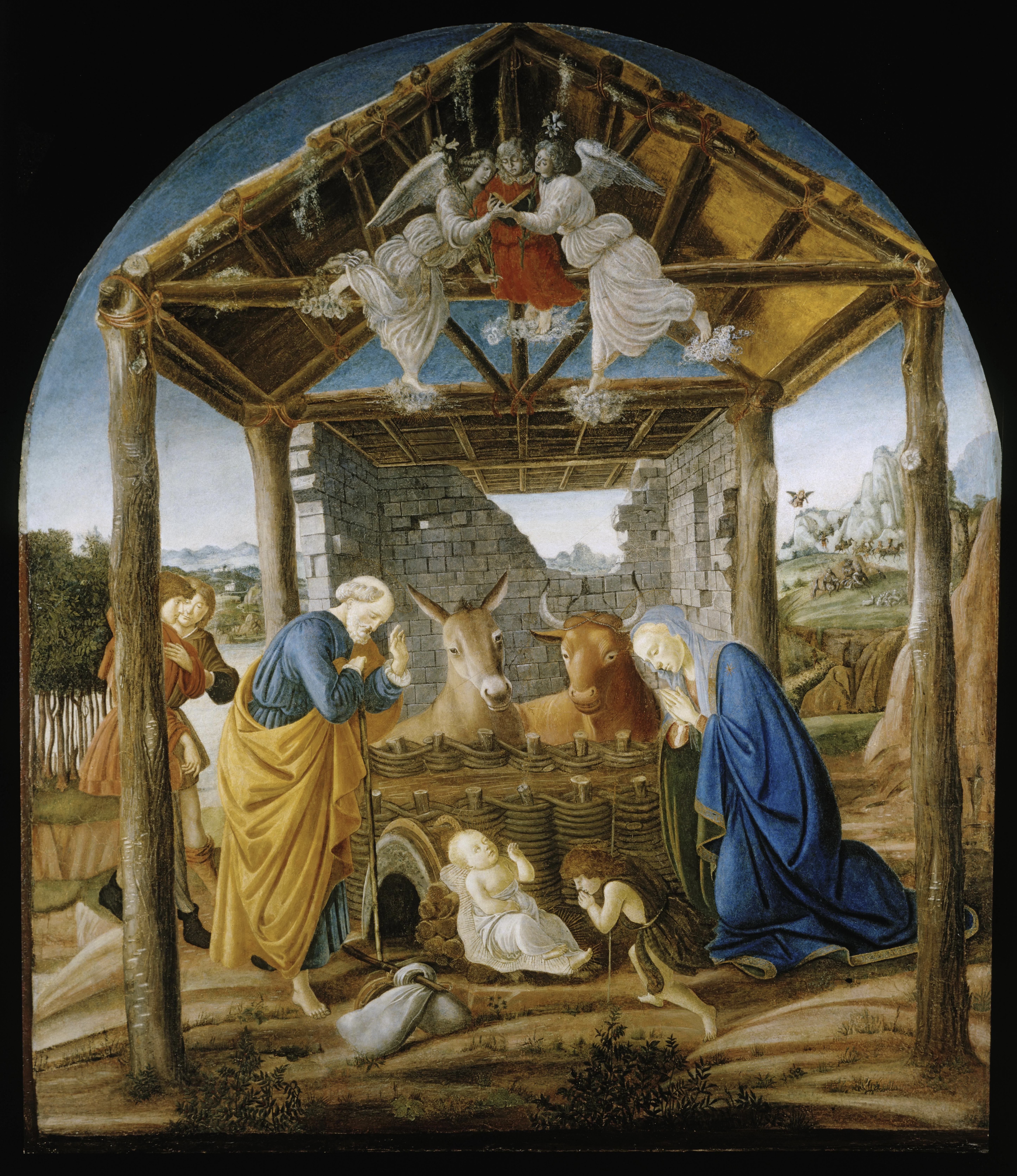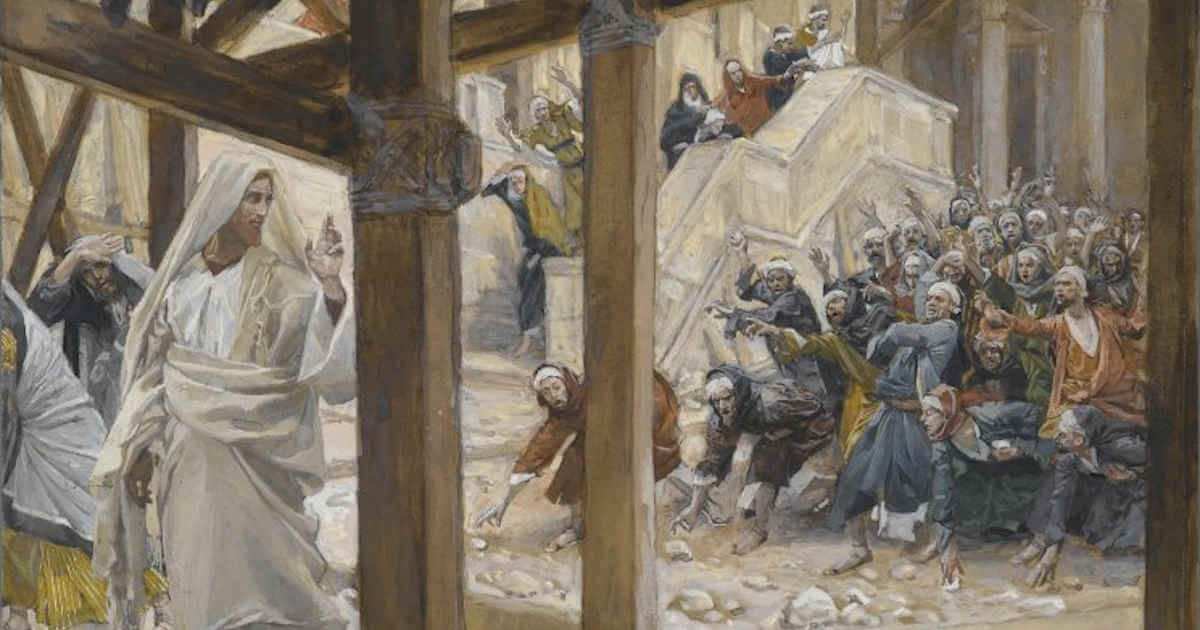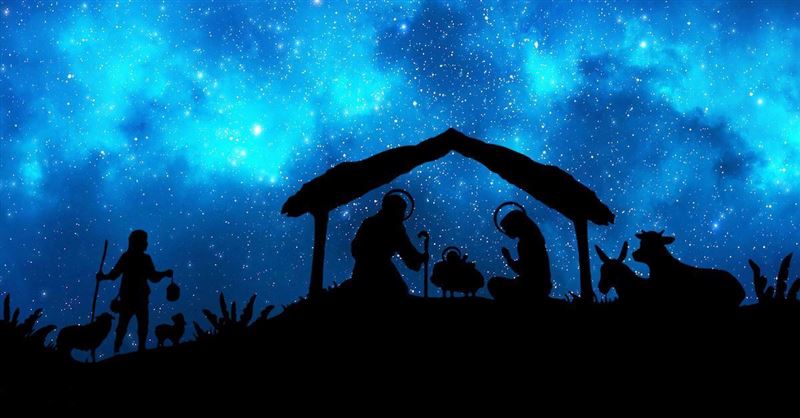
Matthew 1:18-25 (Matins)
Galatians 4:4-7
Matthew 2:1-12
"What Child Is This?"
.... wise men from the East came to Jerusalem, saying, "Where is He ....?"
(Mt 2:1-2)
In the Name of the Father and of the Son and of the Holy Ghost. Amen.

His birth was
most obscure
and
most remote
.... somewhere, afar off, in nameless fields among shepherds.
To capture this in twenty-first century culture, we would say,
"In some back alley in the wrong part of a decaying town."
Do we really believe that,
in comparison to the Heavenly glory of which
He was emptied to be born among us,
there is any difference between one part of town and another?
These are distinction that we make in the puny scale and scope of our lives.
From the distance of Heaven's glory these are distinctions without a difference.
If Heaven were to take note of them at all,
it would be see how we try to hurt one another with such things.
Shepherds were outcasts of first-century Palestine,
the off-scouring of all things,
St. Paul would say.
Shiftless,
unreliable,
dishonest,
suitable only
to be pushed off to the margins
entrusted with no more than sheep.
Life among them would have been dangerous.
And they themselves were chronically surrounded by rustlers and thieves.
And who did not carry a knife and sword in the byways and highways
of a wilderness?
There was no Temple authority,
no Roman Legions.
It was a free-for-all.
Sandro Botticelli captures all this in his painting "Nativity" (1473-1475)
(posted with this reflection).
He depicts the stable.
At center is the only cradle afforded the Son of God:
a manger.
In Haiti, we would manje, meaning "to eat,"
and
the manger was just that:
an old feeding trough
filled each day for barnyard animals
and
rarely cleaned.
The Lord Jesus lies amongst hay stained with the urine and dung.
The world around Him is broken
signified by the crumbling rear wall of the stable.
His parents are itinerants,
as we can see from
the shoulder stick and sack of belongings lying near the elderly Joseph.
His family,
seeking accommodation,
are manifestly
outcasts,
the refused,
who had nowhere to lay their heads.
The only earthly creatures present to worship the birth of God-among-us
are
the ox and the ass,
who knew the scent of their Creator:
The ox knoweth his owner, and the ass his master's crib:
but Israel doth not know ....
(Isa 1:3)
|
The only sons of men present
are
the shepherds,
signified in Botticelli's painting by
diminutive stature,
reserved for
those of lowly social station.
In the furthest background,
rides past indifferent Israel.
They are on horseback denoting their wealth.
The pivotal moment of history unfolds in their near midst,
but they have more important business, which commands their attention.
Besides,
why would they take notice of anything that happens at ground level,
where shepherds and itinerants wander the hard-bitten landscape?
Above the stable are angels singing in the polyphonic harmony
(we see them reading from the same musical score),
signifying the concord of discord.
And this is the irony of angels:
always present, seeing plainly the reality that often escapes us.
Somewhere in this swirl of barnyard dust mix particles
of the mortal and the Divine,
of the dying and the deathless,
of the polluted and the pure.
For this is our life.
And unto us a Savior is born,
Who turns out to be no mere savior but God.
Let us take our humble place
in this chaos-made-suddenly-orderly,
into this filth-made-suddenly-pure,
into this dying-made-suddenly-eternal.
Born within the Creation is the Creator.
All earth is bound by time and space.
But He alone is the Master of all, both time and all space.
C. S. Lewis wrote
that once there was One born in a tiny stable Who was greater than the entire universe.
Our earliest Christian ancestors in the West,
those Christians who migrated from Kiev and then settled in western Ireland and Scotland
pondered this
through the uncomprehending imagination of His Mother .... as they imagined it.
She sings,
King of kings, Most Holy One,
God and Son Eternal One,
You are my God and helpless Son,
High Ruler of mankind.
("Christ-child Lullaby," Trad. Hebrides carol)
|
Well might we cry out with the English
people of centuries past,
"What Child is this?"
(".... Who, laid to rest, on Mary's lap is sleeping?")
What Child is this?
As the Disciples would cry out later,
"Who then is this .... Who commands the winds and waves .... and they obey Him?"
And His question to us was always,
"Who do you say that I AM?"

Indisputably,
no one born into the world has
touched more lives than He.
But how could this possibly be?
For He was born into obscure and degrading circumstances.
His life
was marked as undeserving of attention.
He then went into further obscurity into a landscape of alienation in Egypt
being hunted down as a criminal even as an infant.
After that His parents lived
in disreputable Galilee (by the Jewish standard, disreputable).
He was called illegitimate in His own village,
not "Jesus bar Joseph,"
but rather "Son of Mary" (Mk 6:3)
—
an epithet
nearly synonymous with "bastard."
He [was] despised and rejected by men,
A Man of sorrows and acquainted with grief.
And we hid, as it were, our faces from Him;
He was despised, and we did not esteem Him.
(Isa 53:3)
|
Attaining maturity,
He is deemed a madman even by His own family,
who attempt to restrain Him and take Him home (Mk 3:21).
He is labeled a heretic and an agitator
by the religious establishment
and,
therefore,
a "person of interest" to the Roman authority.
The people take up rocks to stone Him.
Those who see Him with His followers crossing a horizon
might
call them rag-tag and bobtail.
For they are unemployed.
Some have left their families (I hear) to fend for themselves.
And they have no place to live:
"Foxes have holes and birds .... have nests,
but the Son of Man has nowhere to lay His head."
(Mt 8:20)
|
They seem chronically to have no food to eat.
Even to our own time,
people invent categories for Him
calling Him a teacher or philosopher
as they dream up some democratized procession of pious wisdom figures,
so Jesus can take His place alongside
Buddha,
Confucius,
Gandhi,
and Martin Luther King, Jr.
But this will not do.
Even in His own time,
the Apostle Paul
rejected the ridiculous idea that Jesus was a philosopher.
The Jews seek after for a sign, he said.
The Greeks seek after wisdom.
But we have Christ crucified,
which is a stumbling block to many and foolishness to all
(1 Cor 1:22-25).
C. S. Lewis wrote,
Either this man was, and is, the Son of God, or else a madman or
something worse. You can shut him up for a fool, you can spit at
him and kill him as a demon, or you can fall at his feet and call
him Lord and God. But let us not come with any patronizing nonsense
about his being a great human teacher.
(C.S. Lewis, Mere Christianity, 32)
|
Who then is this?
Christology,
the field
set apart by theologians
to answer this question,
has contributed little to the answer.
The
greatest Christology produced in the West,
written by the
Hungarian
Cistercian
Fr. Roch Kereszty, O.C.,
makes this point plainly.
Reviewing
the major Christologies
of the modern period,
he points out that they share one common trait:
each Christology has projected onto the figure of Jesus the author's own ideals.
That is,
the Jesus in their hands in little more than a vehicle for advancing their own
egos.
We might extend this principle
saying
that this is a trait commonly to be found among all followers of Jesus in the modern period.
He is described as lowly, meek, and mild though He is without question
the flintiest prophet to be found in the Bible.
He is described as all-forgiving
though Jesus constantly depicts an awful justice awaiting those who have offended God.
He is described as being most patient and understanding,
yet He demands that His followers give their possessions to the poor (Mt 9:21),
let the dead bury the dead (Mt 8:22),
and
take up a cross each day (Mt 16:24, Mk 8:34, Lu 9:23).
He knows that all of the Twelve whom He has called are destined for suffering and martyrdom (save one).
We can picture one of His disciples coming to Him and private "explaining"
himself,
"You see, when I was twelve, something happened to me, and that can explain ....."
But he stops talking as he beholds the flinty stare fixed upon him .... followed by silence.
You see,
we also project on to Jesus what we most want from Him .... as we picture
heaps of presents piled high under a green tree.
What is it we all want from Him?
passivity,
forgiveness,
and
patient understanding.
I do not say that He lacks these.
I say only that it is foolish to paint His portrait using only these paints.
We want Him to carry us across the sandy beach in His arms,
as the "Footprints" poem would have it,
without ever noticing that He has asked us to be the ones who are to bear Him ....
like
the Most Holy Theotokos,
like St. Christopher,
whose names mean to bear Christ.
These are our imposing role models,
lest we become part of a gaggle of people
insulting God
and
then waiting to be swept into Heaven by Jesus.
Who are our role models, then?
Those who stand up at the sound of His Name
and
say,
"Send me.
I will go"
(Isa 6:8).
He is .... the Mysterious Stranger,
who tells the Governor of the Roman Province of Judea
explicitly
|
"My Kingdom is not of this world."
(Jn 18:36)
|
What?!
A King?
And where is
this "Kingdom not of his world"?
He was the Philosopher who left no philosophy,
the Religious Leader without visible ordination,
the Teacher who left no organized teachings,
the Master Whose disciples have all fled (save one).
And He dies a nameless, naked criminal lacking even His clothes and a grave with a chiseled name.
That is,
He left the world in precisely the way He entered it:
covered with filth,
marked for obscurity,
dirt poor,
and
despised among men.

As we return to the manger
last night,
on a silent night,
gazing upon His most luminous face,
hearing the voices of angels (for those with ears to hear),
let us ask
a simple question.
How could all this ever come to pass?
You might set out in any direction in this wide world
—
on every mountain top,
in every dusty village,
down every lonely road,
far away from a signal for your smart phone
—
and
meet with those who love Him,
indeed,
who have formed and shaped their whole lives according to His wishes
(for, yes, the Disciples did return and gather together the words that He spoke).
How could a conversion of 2.6 billion people ever have happened?
We must honestly say, "This is not impossible."
There is only one explanation that is possible:
He was, and is, Who He claimed to be.
And, so,
we take our humble
and
silent place
beside Mary,
Who says,
You are my God and helpless Son,
High Ruler of mankind.
|
Let us seek always to be with Him and His outcast parents and the pariah shepherds.
Let us face the same inhospitable world that they faced.
Let us be rejected by men as they were.
"Send me!
I will go!"
And let us rejoice on a silent night.
For here is our only hope, our only peace, and the only good.
In the Name of the Father and the Son and the Holy Spirit.
Amen.



